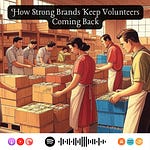Do you ever find yourself listening to the same song repeatedly, only to find it’s lost its spark? Or ordering your usual takeout, but the excitement is just...gone? This phenomenon, known as hedonic adaptation, is your brain's natural tendency to get used to things over time – even the good stuff. In this episode of the Marketing Science Lab, we explore a fascinating research article from the Journal of Consumer Psychology that delves into this common experience and offers a surprising solution: creative thinking (You, 2024).
What is Hedonic Adaptation?
Hedonic adaptation explains why that initial thrill we experience with something new eventually fades. It’s why that song that once gave you chills now barely registers, or why that delicious meal has become just another dinner. Our brains are wired for novelty, constantly seeking new experiences. This isn't necessarily a bad thing, but it can lead to a sense of boredom or dissatisfaction with things we once loved.
The Power of Creative Thinking
The research highlighted in this episode suggests that creative thinking can significantly reduce hedonic adaptation. By forcing our brains to be flexible and see new angles, we can actively re-engage with familiar experiences and find fresh enjoyment. This isn't about becoming an artist; it's about actively engaging with the experience, even in small ways.
Creative Thinking in Action: Research Examples
The researchers tested their theory with several clever experiments. In one study, participants viewed the same photograph multiple times. One group was instructed to find something new each time they looked, while the other group viewed it the same way every time (constrained cognitive flexibility). As expected, the group that focused on finding new details experienced significantly less boredom.
Another study involved a more literal "taste test." Participants ate the same sausage multiple times. Some participants received a plain sausage, while others got a flavorful, more complex one. For the plain sausage eaters, creative thinking made a world of difference in staving off boredom, but surprisingly it had little impact on the people already stimulated by their meal.
Applying Creative Thinking in Everyday Life
The key takeaway from this research isn’t about needing to never be bored again (which is unrealistic), but to actively seek novelty in our experience and change our relationship to boredom. Here are some practical applications:
Mindful Consumption: Instead of inhaling your takeout, think about the different spices, textures, and origins of the food.
Shake Up Your Routine: Try something as simple as answering emails out of order or taking a new route to work.
Curiosity is Key: Cultivate a sense of curiosity about the things you encounter daily. Look for the details you haven't noticed before.
Beyond the Concrete: Future Research
The research primarily focused on tangible experiences like food and music. But what about more abstract concepts like boredom in relationships or with our own thoughts? This raises intriguing questions about how we can apply these findings to other aspects of our lives.
Taking Back Boredom
By consciously engaging with the world around us and seeking out novelty in the mundane, we can fight hedonic adaptation. It’s about realizing we have more control over boredom than we think. Next time you feel that familiar sense of boredom creeping in, remember: don’t check out, check in.
Interactive Study Guide: https://quizlet.com/study-guides/reigniting-joy-through-creative-thinking-b2130156-2a91-45fb-a395-ef9c1891baad?i=3i62em&x=13qt
Source:
You, Y. C., Wang, L., Yang, X., & Wen, N. (2024). Alleviating hedonic adaptation in repeat consumption with creative thinking. Journal of Consumer Psychology, 00, 1–16. https://doi.org/10.1002/jcpy.1439













